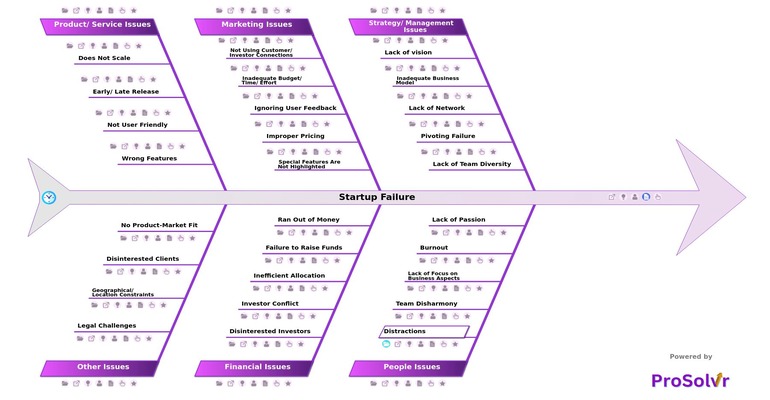Root Cause Analysis of Startup Failure
Startup failure is a prevalent challenge in the entrepreneurial landscape, with many new ventures facing obstacles that prevent them from achieving sustainable success. Understanding the root causes of startup failure is essential for aspiring entrepreneurs and investors alike to mitigate risks and increase the chances of success. Several key factors contribute to startup failures, encompassing market dynamics, execution challenges, financial issues, and strategic missteps.
Market dynamics play a crucial role in determining the success or failure of a startup. Failing to identify a viable market opportunity or misreading market demand can lead to products or services that do not resonate with customers. Inadequate market research and validation can result in misguided product development efforts, pricing strategies, and go-to-market plans, ultimately leading to market rejection and failure.
Execution challenges often plague startups, particularly in the areas of product development, operations, and scaling. Poor execution can result from a lack of experience, insufficient resources, or ineffective management practices. Inconsistent product quality, operational inefficiencies, and misaligned team dynamics can hinder a startup's ability to deliver value to customers and compete effectively in the marketplace.
Financial issues, including poor cash flow management, inadequate funding, and unsustainable business models, are significant contributors to startup failure. Running out of capital or failing to secure necessary funding rounds can cripple a startup's growth and operational capabilities. Moreover, overlooking key financial metrics, such as customer acquisition costs, lifetime value, and unit economics, can lead to financial instability and eventual failure.
Strategic missteps, such as poor market positioning, lack of differentiation, and failure to adapt to changing market conditions, can also contribute to startup failures. Startups need to be agile, responsive, and willing to pivot their strategies based on market feedback and competitive dynamics. Failing to evolve and innovate can result in becoming obsolete or outcompeted by more agile and innovative competitors.
In conclusion, startup failure is a complex and multifaceted issue that requires careful planning, execution, and adaptation to overcome. By addressing market dynamics, improving execution capabilities, managing finances effectively, and making strategic decisions, startups can increase their resilience and improve their chances of achieving sustainable success in a competitive business environment.
Who should use the Startup Failure template?
- Entrepreneurs: Aspiring and current entrepreneurs can use this template to identify potential pitfalls and challenges.
- Investors: Use this template to evaluate startups and make informed investment decisions.
- Business Consultants: Guide clients through potential challenges and help develop robust business plans.
- Educators and Students: Utilize this template as a learning tool in entrepreneurship and business courses.
- Startup Incubators and Accelerators: Use as part of training and mentorship programs for early-stage startups.
- Business Analysts and Researchers: Analyze trends, conduct case studies, and develop insights into startup ecosystems.
Why use the Startup Failure template?
- Identify Potential Pitfalls: Recognize common challenges and pitfalls that startups may encounter.
- Proactive Planning: Be proactive in addressing issues and developing strategies to mitigate risks.
- Informed Decision-Making: Make informed decisions when investing in or supporting startups.
- Educational Resource: Learn from the experiences of others to improve entrepreneurial skills and knowledge.
- Strategic Guidance: Provide valuable insights and guidance to startups, helping them navigate challenges more effectively.
- Research and Analysis: Analyze trends and factors contributing to startup success or failure for academic or business purposes.
The Startup Failure template serves as a comprehensive guide for understanding, analyzing, and addressing the challenges faced by startups, making it a valuable resource for anyone involved in the entrepreneurial ecosystem.
Draft and create a template for problem analysis in ProSolvr by smartQED.
Curated from community experience and public sources:








